The Superhero Origin… Again?
We all love an origin story, right? But how about the origin story rebooted, then rebooted, then rebooted ad nauseum? But wait…isn’t that what happens in the comic book series? Why is it then that the rebootings of superhero origin stories in film are so upsetting to the fan base? Why also if we all complain so much about reboots do we still flock to the cinema? This brings us full circle to the question from the start: we all love an origin story, right?

What is a superhero origin story?
Interestingly, it is actually quite difficult to pin down a comprehensive definition of an origin story. Standard online definitions provide generalisations of “a story about the origin of a character” or “how they became who they are.” Partly, this ambiguity is due to the fact that the phrase origin story, or origin myth if you prefer, is exactly what it states – it is the story that captures the emergence of a hero. In fact, the concept of the origin is a core element at the heart of the definition of a superhero. In Peter Coogan’s seminal definition of the superhero, he writes:
A heroic character with a selfless, pro-social mission; with superpowers – extraordinary abilities, advanced technology, or highly developed physical, mental, or mystical skills; who has a superhero identity embodied in a codename and iconic costume, which typically express his biography, character, powers, or origin (transformation from ordinary person to superhero). [emphasis added] 1
Coogan has captured the essence of the power of the origin story – that it displays the ‘transformation from ordinary person to superhero.’ Is this not the core appeal of the superhero? That they were once ordinary, like us, but through some intervention they are now a super-human version. This moment of transformation is what captures the passion of the audience; it is the moment we are most enthralled by. Yes, we love the action, the defeat of the bad guys, etc. but this one crystallising moment where a character is raised up from the unknown into a hero 2 is what draws us back to the genre again, and again. Yet this does not in full capture why such a simplistic narrative device is able to capture the imagination of millions of people.
The appeal of the origin story
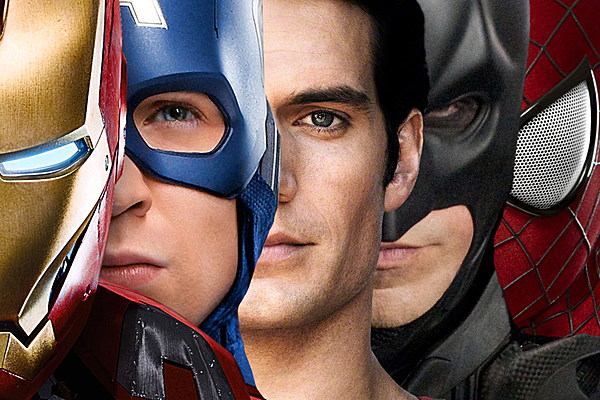
Perhaps it is that origin stories can inspire us or provide models for coping with adversity, or finding meaning from loss and trauma, or perhaps even discovering hidden strengths that can be used for good. 3 Is it not the bridge between the relatable, the normal person who is just like us, and the aspirational, somehow becoming faster, stronger, better? 4 When you consider the origin story, especially if it is a character we already know, it can often appeal to contradictory desires: for something nostalgic, and something new. 5 An origin story is about the journey of a character that sets them on a road we are already familiar with, thus appealing to our nostalgic desires to engage with a comfortable past. Yet, it is also often new in the sense that we may not have seen this particular interpretation, or insight to the character’s origins, thus engaging us in new story telling in a comfortable manner.
Fundamentally also the origin story plays a rather vital part in narrative storytelling. A film in particular is a highly structural narrative device that needs to ensure the maintained engagement of the audience. As such the origin story is often logically positioned to occupy all of the first act to help ground the understanding of the real world the hero has emerged from. It will include their dreams, their relationships and the lives they have been living. 6 It is often a vital element that is required to ensure the CGI action of the third act has believability and connection to the hero’s arc. The origin story is required to allow the audience to understand the how and why of what is happening in the action sequences of the film. One begins to see the difficulty then in why filmmakers continually return to the origin story, for when you tell a superhero tale it is a natural impulse to want to start at the beginning. 7 Otherwise the risk becomes that a superhero film is nothing but super-human figures bashing each other with ridiculous powers – entertaining? Yes. Sustainable? Not so much.
Yet here’s the big question of the moment – why the rise of the reboot?
1. Is it about money?
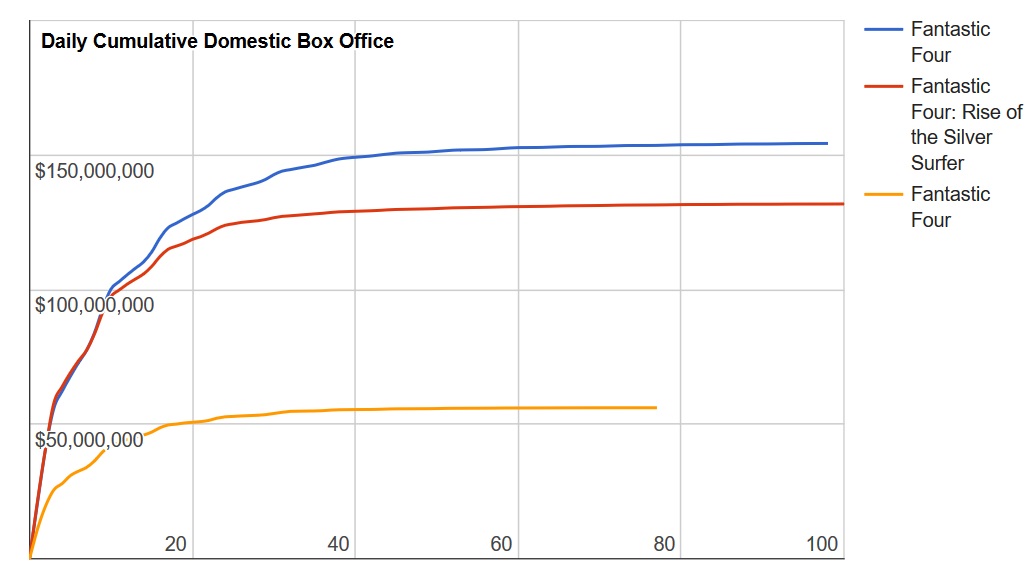
An obvious argument could be made for the fact that perhaps studios are responding to the domestic block buster sales numbers. With the failing of their franchise sequels, they then look at the original numbers of the first film – the origin story – and consider if another new generation is ready to re-meet their hero. However, when you look at the earnings it paints a very interesting story. Absolutely Spider-Man did better in box office earnings than the two following sequels, yet The Amazing Spider-Man and its sequel did progressively worse. Spider-Man Homecoming, however, not jumping as high as the first did actually do overall better than Spider-Man 3, and both The Amazing Spider-Man’s. Is this indicative that a reboot was successful here because of the timing? After all there is twelve years different between the films. Yet there is about the same time frame between the first and most recent Fantastic Four film (ten years) and the latest film has tanked dismally at the box office. Only five years separated Hulk and The Incredible Hulk, but they are both within a tiny margin of each other in their earnings.
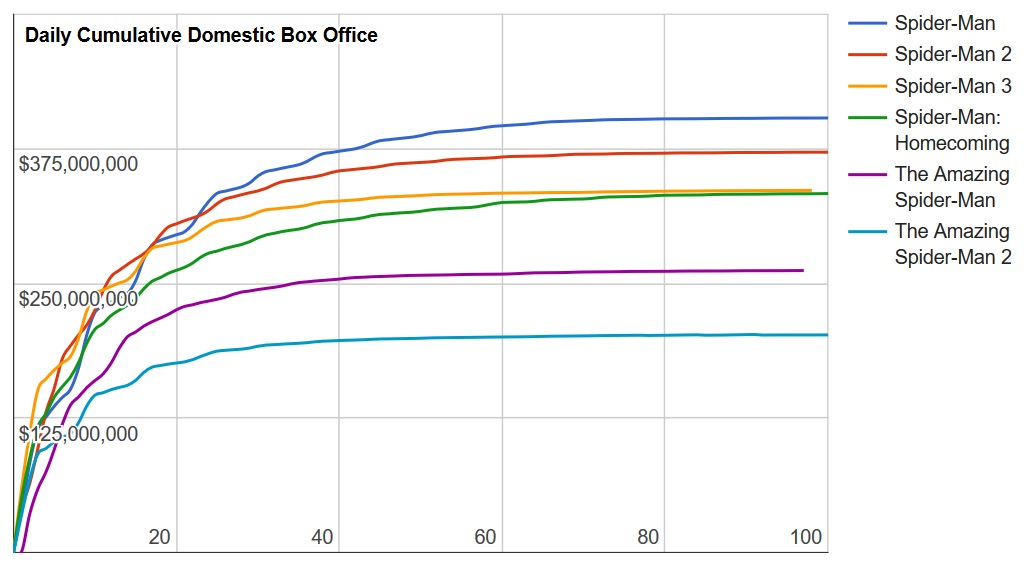
There is then the issue of the Batman franchise. Looking at the domestic box office is a fascinating endeavour, considering especially that it does not reflect the changing financial differences in the periods of time between the original 1966 version and now. However, what is interesting to look at is the huge success of the first of the new franchise with The Dark Knight, followed by the steadily dropping numbers of its sequels, with actually the first of the franchise being the origin story of Batman Begins, which falls as low as the original versions in box office numbers. So indeed it does not easily appear that the act of rebooting equals financial success.
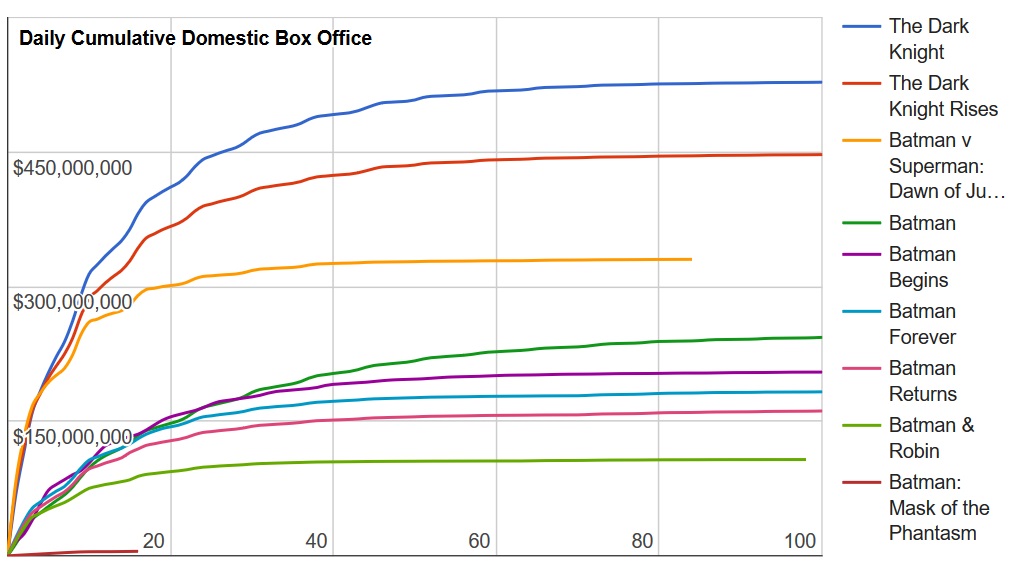
Yet, regardless of comparison numbers, the average box office gross (minus production budget) for a reboot is a cool $52 million. 8 However, the films that are grossing off the charts are actually the sequels in series such as Jurassic World, Avengers: Age of Ultron, and Furious 7, which really does beg, again, the question of why do studios continue to push and fund reboots? 9
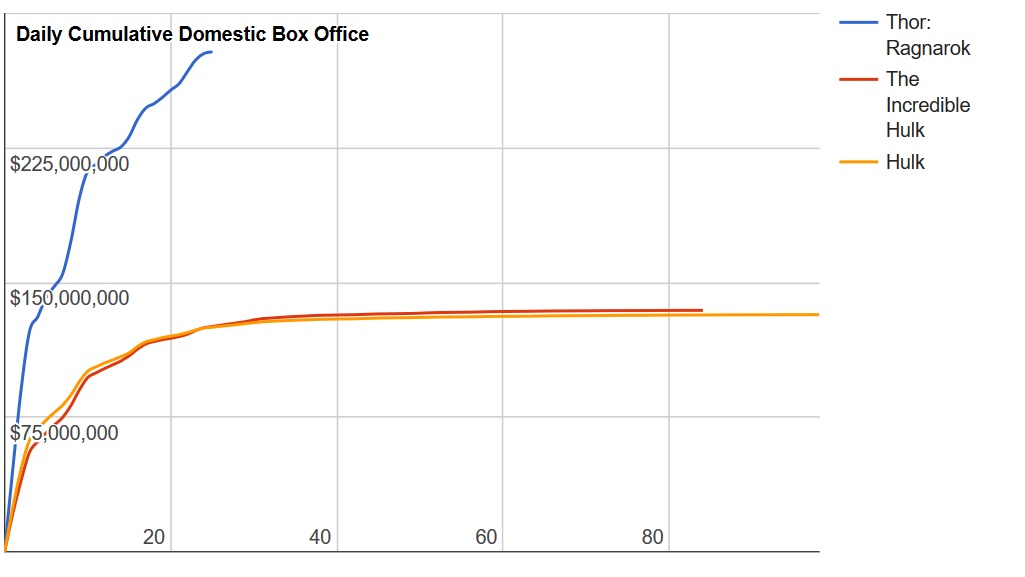
2. Is it about ownership?
One argument often made is that the use of the origin story is the filmmakers paying their due to the brand’s original fan base, 10 or alternatively as justification for breaking canon. Or is it to pay homage to the genre, by working to begin at the very beginning? Yet there is fair argument that many comics did not always begin with the origin story themselves. For instance, in 1961 Stan Lee and Jack Kirby introduced the heroes of the Fantastic Four powering up following a summons. There is a quick flash back to the origins, but the comic then gets back to the focus on the battle. 11
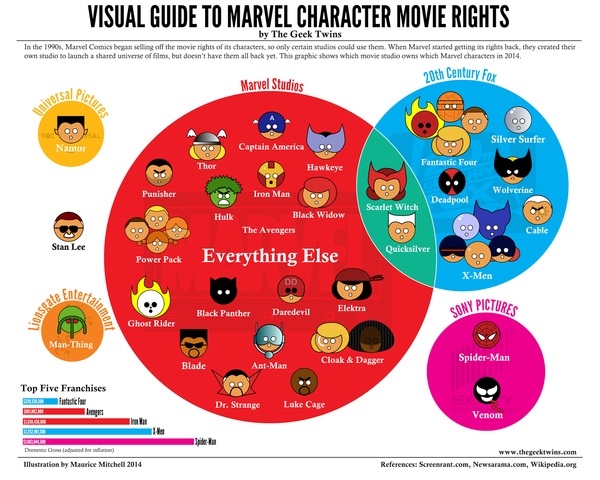
However, in relation to a number of the film remakes the reboot can be directly tied to the matter of ownership – in relation to the rights, the studio and the director – all of these stakeholders have wanted a chance to offer their unique vision of the superhero’s origins. Let us take a moment to look at the break down of a few of the most obvious reboots and their ownership.
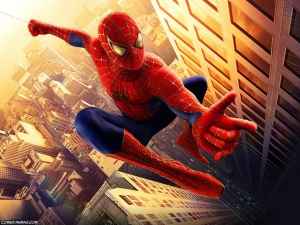
First up is Spider-Man.
The original rights were purchased in 1985 by Sony and the 2002 release was directed by Sam Raimi who went on to make two further sequels. Then in 2010 Sony announced a reboot by Marc Webb who focused on the comic format of The Amazing Spider-Man, with two films. Then in 2015 Disney, and with them Marvel Studios, announced a deal with Sony to use Spider-Man in the Captain America: Civil War. A new Spider-Man, sans origin story then appeared.
Second – Fantastic Four.
Constantin Films bought the rights in 1986 with a low budge version produced in 1992 under Roger Corman. In 2004 a distribution deal with 20th Century Fox saw the two films emerge directed by Tim Story. Then a reboot occurred in 2015 directed by Josh Trank to negative reviews, including from the director himself.
Batman has perhaps experienced the most change.
First came the adaption of the television version in 1966. Then in the 1980s Warner Bros began a series, with Tim Burton at the helm in 1989 and 1992. Then Joel Schumacher in 1995 and 1997. Note also that Burton’s Batman was Michael Keaton, while Schumacher used two different actors: Val Kilmer and George Clooney, respectively. The reboot began with Batman Begins, a true origin story, in 2005 directed by Christopher Nolan, with then two further instalments of the trilogy. Warner Bros in response to Marvel’s move launched their own cinematic universe, which picked up another new Batman in 2016 directed by Zack Snyder. Interestingly, the reboots of Batman have not always centred on an origin story, but rather incorporated a flash-back formula to support character growth and in many ways this has helped separate the franchise from the others – although arguably what they do have is supervillain origin stories instead as the key premise of each film. However, an interesting consideration here is that unlike the Marvel films that have been released through various studios, DC has consistently operated with Warner Bros for their releases allowing a greater continuity.
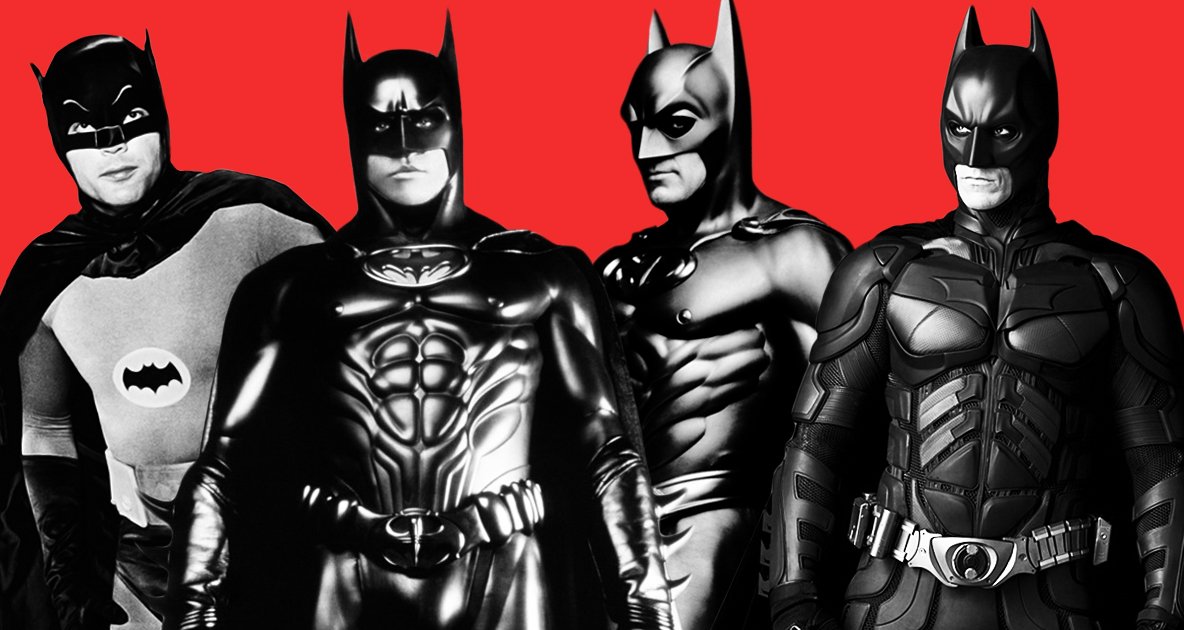
With so many different cooks in the kitchen it is no wonder that the reboot is continuously occurring. Really, perhaps the only way forward will be the uniting of all Marvel under the Marvel Cinematic Universe (consider Disney’s eagerness to purchase Fox Studios and the wave of X-Men films we are sure to soon see), but even then if franchises keep swapping hands we should prepare ourselves for more reboots to come.
3. Isn’t it always about the Monomyth anyway?
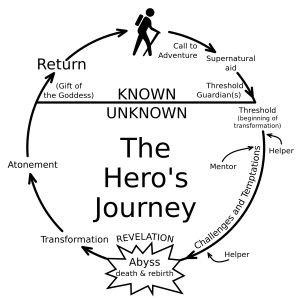 It is of course, impossible to have a discussion about origin stories, or even really superhero stories, without discussing their connection to Joseph Campbell’s monomyth. After all at its heart a superhero story can always be summarised as a tale about a hero who battles supernatural forces and returns home with greater power. 12 Superheros are simply the modern day demi-gods, who must have come from somewhere; and origin stories are the framework that tell us where and how they have emerged as heroes. 13
It is of course, impossible to have a discussion about origin stories, or even really superhero stories, without discussing their connection to Joseph Campbell’s monomyth. After all at its heart a superhero story can always be summarised as a tale about a hero who battles supernatural forces and returns home with greater power. 12 Superheros are simply the modern day demi-gods, who must have come from somewhere; and origin stories are the framework that tell us where and how they have emerged as heroes. 13
Campbell’s monomyth emerged as the summation of an examination of mythological stories of the archetypal journey of a hero through fifteen phases; it is collected in full in his opus The Hero with a Thousand Faces. What Campbell’s monomyth captures is the progression of a hero’s journey through what have become iconic stages and are especially pertinent to the study of fantasy, and now superhero genres. It is also, to an extent, the easiest and most recognisable form of storytelling and at its heart it is the origin story. Beginning with the Departure a hero experiences a call to adventure and receives supernatural aid. In superhero stories, the supernatural aid is the source of their new powers. They then cross the threshold, which symbolises moving into the field of adventure, and enter the belly of the whale, which is their willingness to engage with their new powers. Following this stage is the Initiation where the hero undergoes a road of trials, meets a love interest, experiences temptation, atonement and apotheosis (realisation of a greater truth), before finally achieving the ultimate boon, which is usually the acceptance of truth or wisdom. The hero then Returns to learn to live in the moment and take up their mantle of hero (the process follows the initial refusal to return, a magic flight, rescue from without, crossing the return threshold, becoming a master of two worlds and finally the freedom to live). 14
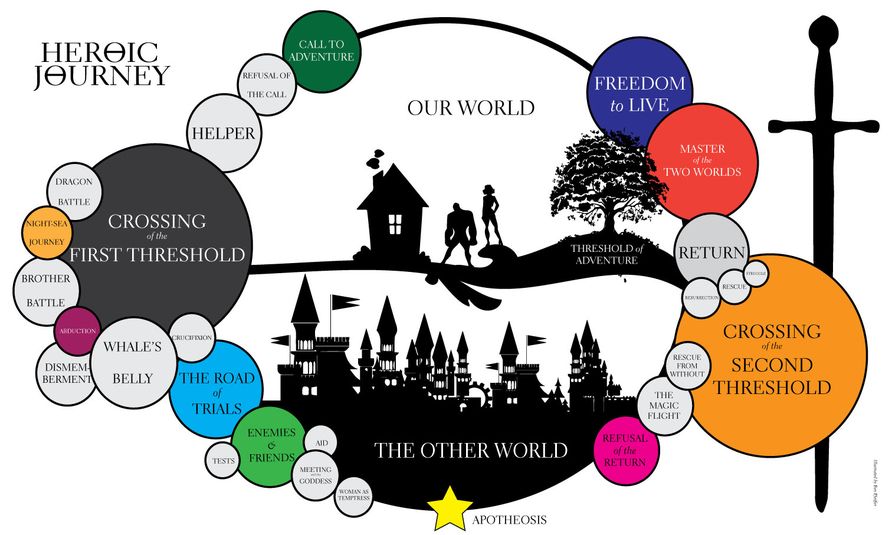
Does this sound familiar? It should as it is the exact narrative plot points present in every superhero origin film. The monomyth reflects an important truth about our love for linear narratives, but it is also considered lazy writing as nothing a writer does while following this formula will be new to the audience. Instead what most successful superhero films appear to do is take one aspect of the monomyth and make that the focus, or they jumble the series using flash-backs and character-driven dialogue to capture moments within the hero’s journey. Two really interesting examples of a new approach to inclusion of the origin story and reboot are The Incredible Hulk and X-Men: Days of Future Past. The Incredible Hulk actually includes the origin story of the Hulk in the opening credits in a montage form. While X-Men: Days of Future Past actually returns into the past (the source of the origin story) to tell the alternative story and reboot the series.
The best and worst reboots.
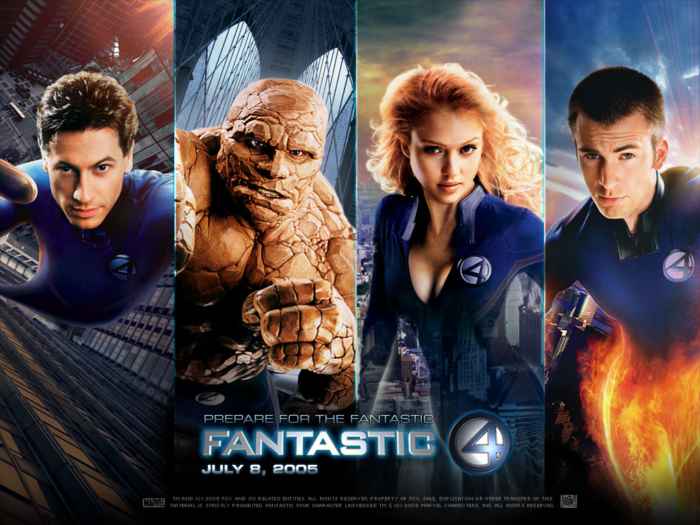
This is the most controversial topic, as everyone has their own opinions. Yet, this is a key consideration as it is the viewers, the fans, the audience that determine the box office success and failure of different superhero films. So simply based on the discussion engaged with here there are arguments that can be made for each film. For instance Batman Begins can be considered a great reboot simply because it was considered a necessary step to solidify the unclear origin of Batman in preparation for developing the new Dark Knight Trilogy. However, financially it was not a success when compared that same trilogy, which begs the question – would the trilogy have done so well if Batman Begins was not made?

High on the list of reboots complained about online are of course Amazing Spider-Man and Fantastic Four. One argument for the problematic reception of Amazing Spider-Man was that it occurred too close to the end of Reimie’s series, where Batman perhaps succeeded by the larger time span between the last film and the reboot. Fantastic Four, however, has no such excuse as it has (within the fickle mind of Hollywood) been long enough for a reboot to occur. It also used the same name, giving no real distinguishing feature to even justify why a reboot was occurring. Batman was the beginning, the origin story we had not really ever had in full – while we know the catalyst for Batman, this film provided us with a framework to understand how Batman as a hero emerged. Spider-Man also attempted to identify itself as emerging from a particular version of the comics – not in itself a bad idea to appeal to a particular demographic of fans. Yet, here we have Fantastic Four, same name…same narrative points…what was the point of this again?
So, where does this leave the superhero origin story? The age of the reboot may appear to be fading with the rising popularity of ongoing franchises, however, there is still a need for trepidation. Directors that appear to embrace the move from origin stories to a more faithful revitalisation of the comic version are having greater critical success, yet leaping into the action leaves ambiguity around the character’s backstory, and if not handled carefully can lead to later disappointment when audiences notice continuity issues with earlier films. Is there an easy solution? No. However, perhaps rather than spending millions on endless poor reboots, studios could in fact employ the right people with the right vision (note that this is not a reboot example, but based on the inclusion of this film in The Hulk box office chart) – take Thor: Ragnarok for instance – who would have thought giving such a huge franchise to a fairly independent filmmaker such as Taika Waititi could have lead to such an outstanding and enjoyable film? Does this mean that superhero films should just skip the origin story? Not necessarily. There is still a vital place that origin stories play in film franchises, but perhaps – one could suggest (without having to do the hard work themselves) – they could just get it right the first time?
We all love an origin story, right?
Works Cited
- Coogan, P. (2006). Superhero: The Secret Origin of a Genre. MonkeyBrain Books. Print. ↩
- Whitbrook, J. (26 Nov 2014). ‘Why are we so fascinated by Origin stories? Gizmodo. Retrieved from https://gizmodo.com/why-are-we-so-fascinated-by-origin-stories-1663820928?IR=T ↩
- Rosenberg, R. (Feb 2013). ‘The psychology behind superhero origin stories.’ Smithsonian Magazine. Retrieved from http://www.smithsonianmag.com/arts-culture/the-psychology-behind-superhero-origin-stories-4015776/#w3Hobh1u4R0zuLy ↩
- Markovitz, A. (12 Dec 2012). ‘Man of Steel’: Another Origin Story? EW. Retrieved from http://www.ew.com/article/2012/12/12/origin-stories-man-of-steel-superman/ ↩
- Whitbrook, J. (26 Nov 2014). ‘Why are we so fascinated by Origin stories? Gizmodo. Retrieved from https://gizmodo.com/why-are-we-so-fascinated-by-origin-stories-1663820928?IR=T ↩
- Weldon, G. (11 Jul 2017). ‘Origin-al Sin: What Hollywood must learn from “Spider-Man: Homecoming”.’ Monkey See. Retrieved from https://www.npr.org/sections/monkeysee/2017/07/11/536508517/origin-al-sin-what-hollywood-must-learn-from-spider-man-homecoming ↩
- Berelatsky, N. (11 Aug 2015). ‘Pulling punches: why origin stories keep superhero films from soaring.’ The Guardian. Retrieved from https://www.theguardian.com/film/2015/aug/10/superhero-movies-origin-stories-fantastic-four-film ↩
- Helena, R. (4 Sep 2015). ‘The 5 Best and 5 Worst Movie Reboots.’ Taste of Cinema. Retrieved from: http://www.tasteofcinema.com/2015/the-5-best-and-5-worst-movie-reboots/#ixzz4zo5bJej7 ↩
- Helena, R. (4 Sep 2015). ‘The 5 Best and 5 Worst Movie Reboots.’ Taste of Cinema. Retrieved from: http://www.tasteofcinema.com/2015/the-5-best-and-5-worst-movie-reboots/#ixzz4zo5bJej7 ↩
- Markovitz, A. (12 Dec 2012). ‘Man of Steel’: Another Origin Story? EW. Retrieved from http://www.ew.com/article/2012/12/12/origin-stories-man-of-steel-superman/ ↩
- Berelatsky, N. (11 Aug 2015). ‘Pulling punches: why origin stories keep superhero films from soaring.’ The Guardian. Retrieved from https://www.theguardian.com/film/2015/aug/10/superhero-movies-origin-stories-fantastic-four-film ↩
- Rosenberg, R. (Feb 2013). ‘The psychology behind superhero origin stories.’ Smithsonian Magazine. Retrieved from http://www.smithsonianmag.com/arts-culture/the-psychology-behind-superhero-origin-stories-4015776/#w3Hobh1u4R0zuLy ↩
- Weldon, G. (11 Jul 2017). ‘Origin-al Sin: What Hollywood must learn from “Spider-Man: Homecoming”.’ Monkey See. Retrieved from https://www.npr.org/sections/monkeysee/2017/07/11/536508517/origin-al-sin-what-hollywood-must-learn-from-spider-man-homecoming ↩
- Campbell, J. (2008). The Hero with a Thousand Faces. California, USA: New World Library. ↩
What do you think? Leave a comment.











Some of my favourite Spider-Man stories take place when Peter Parker is in his 30’s. But again we get a new Spider-Man err Boy and we are going to have to sit through the same old story again.
Thanks for the article. I love origin stories. It’s the fascination with seeing ordinary people be given extraordinary powers that fuels the ongoing love of superheroes.
Those ordinary people are who we relate to, not the superhero that they become, who can do ridiculous things. it’s why they have origins, and so much care is taken to show that they are so often ordinary people. that’s the fantasy.
If it was just aliens who always had the powers, we don’t care as much. we like the geeky kid who gets bitten by a spider (or whatever superhero you want to insert here) and can suddenly deal with the problems he couldn’t before, yet suddenly has a whole new world of problems to deal with as well. if he could always sort his life out, and doesn’t have relatable problems, but only has to worry about the supervillain that is going to blow up the world, that’s when it gets boring.
People disagree, but it’s why these things always get rebooted a few movies in. once you’ve dealt with the ordinary human issues, and focus entirely on their problems as superheroes, we have nothing to relate to, and all you’re left with is a bunch of superpeople in tights hitting each other. and that’s boring. so they go back to the origins and tell it again. people moan about it, but it’s the only interesting part of each superhero story, hence why they always feel the need to retell it.
Yes – I think the ‘origin story’ is actually pretty rich in terms of storytelling and drama. You have dramatic change, you have a character forced to make big choices (what do I do with my powers), you have metaphor (powers standing in for wealth/ guilt/ puberty or whatever). You can have your character gaining his powers at a high personal cost and examining what that does to him/her. It’s fertile ground. I was under the impression that the sequel was usually the tougher story because the most dramatic moment in the character’s life has now been dramatized. It usually ends up being about the villain because now they’re the one who’s changing. It’s notable that one of the best superhero sequels – Spider-Man 2 – basically reworked the origin story a second time, with the twist that he now becomes Spider-man by choice. I thought that was neat and clever and thoughtful;
The best thing to do is to do what ‘The Incredible Hulk’ did and just have the origin story in the credits. If you look at the original origin comics for most superheroes. They only devote a few pages of panels depicting the origin before swinging into bright colourful action and fun. We don’t need grim and gritty origins. Just fun superhero antics. Marvel understand this and that’s why they are successful
The execs are so preoccupied with whether or not they could, they don’t stop to think IF they should. We don’t need constant reboots, especially if the first time round wasn’t that popular anyway. Or if the movie was popular, don’t remake it just to have younger actors in it.
At this rate, we’re going to see an Avatar remake soon.
Ironicm considering Avatar is basically a remake of Dances with Wolves!!
The Fantastic Four are just not a very appealing team. Combine that with a weak script and you have a recipe for failure. The origin issue is entirely secondary.
The Fantastic Four are a very appealing family, with superpowers, who happen to explore strange new worlds and meet weird people.
They are not suited to one-off story telling. They are made for a soap opera.
But no-one has the budget so it’s cartoons or comics.
If it’s an Avatar remake with a half-decent script, bring it on…
A bad film is a bad film, regardless of how it approaches the story. Batman Begins is an original story, and it’s awesome. If you think about the first series of Heroes, which was the only one worth watching, the whole series was one big origin story, which again was great. It was after telling the origin that they struggled !
I think the point is you can’t just look to tell a superhero story, you need to tell a story – that just happens to have superheroes in it. Some of the films in the Genre to it well, such as Batman Begins, Guardians of the Galaxy, Iron man – etc etc – where as others just don’t unfortunately.
X-Men – the first movie, that is – also managed the difficulty of origin story for multiple characters very neatly (let’s not talk about X-Men Origins: Wolverine).
I wouldn’t say that the first X-Men was an origins story. Most of the characters are already set up in their X-Men roles.
Cyclops, Storm, Jean Grey are already part of the X-Men setup, lead by Xavier. It’s only Wolverine who joins them but he doesn’t have an origin story, he just helps them find Rogue.
Same goes with the bad guys. Magento, Toad, Sabretooth and Mystique are already set up as a team.
You find out more about Wolverines past in X-Men 2, with the introduction of Stryker.
Yes, the first X-men film did indeed handle it really well. I thoroughly enjoyed that film 🙂
Exactly. From what I’ve heard of the new Fantastic Four film, the real problem is that the studio started off asking the director to make a “dark and gritty” film, then panicked, and imposed re-writes and re-shoots to try and turn it into a light, more family-friendly film. Because of that, it’s a mess – not because it’s an origin story.
Batman Begins is possibly the best example of an origin story done well. Sure, it covered the same plot points, but it was the first film to properly explore why Bruce Wayne becomes Batman.
That being said, if they’re rebooting every franchise every 5 minutes, there’s really no need to keep showing us different versions of the origin story every time (Amazing Spider-Man, I’m looking at you…)
Very well said. I’m particularly glad you mentioned Batman Begins because it’s still my favourite Batman movie so far, and I immediately thought of it when I read the subheading about people just wanting to see action.
Guardians of the Galaxy isn’t an origins story – the “origins” bit takes up all of five minutes at the very start. Showing the posse being put together is not the same as “origins”.
Totally agree – I think Batman Begins is as tight as a drum; far better than the overrated Dark Knight. I loved how literally every main character in it was acted by someone who’d carried a movie in the past; the wealth of talent onscreen at any given moment was palpable. A top, top movie.
James Bond has been ‘rebooting’ for ever – we very, very rarely get any insight as to his ‘origins’ and just get into another formulaic if fun story.
Having said that the latest few seem to want to probe this: that peculiar business in Skyfall, say, where a bug-eyed Finney explains that the young Bond disappeared into a cellar for two days and after – one assumes- some Hamlet-like pondering about his parents’ deaths, emerged from his subterranean womb/chrysalis stage as ‘a man’… and the surrogate mother, Dame Judy, all that stuff.
The lesson seems to be: just to get on with the preposterous story.
Eh? James Bond hasn’t been rebooting. Each movie has a completely different story! The real reboots are the Spiderman and Batman franchises where they just rehashed the first movie’s storyline and just added a few tweaks here and there, more special FX, and different actors and music!
Let me just say that I found all that gussying up in Skyfall to be very unwelcome. “This time, it’s personal” is a card that should only be played once, and OHMSS was that card for the Bond films.
Casino Royale is arguably a reboot. None of the others appear to be candidates.
The origin story is essentially a different genre than the regular superhero adventure story. The problem is the regular superhero adventure story is only interesting if you are under 12 years old.
I doubt this.
James Bond is not going to die yet his adventures still appeal to grown-ups. The stories are visually interesting (except Quantum of Solace) and play on the collective fears of our culture. They are fun ways of looking at our latest bogeyman.
Superhero films do much the same. Just some do it badly.
I think you handled this topic very well and I appreciate the level of sophistication you have demonstrated.
How long, in all seriousness, before someone attempts another adaptation of the Harry Potter books? The last one is now a few years old – another ten years? Twenty years? Cause you know it will happen!
Isn’t the Fantastic Four’s problem that is just isn’t very good and Superhero film fatigue is setting in (Avengers 2 is a good sign of this, despite making a shed tonne of money everyone has pretty much forgotten it already 3 months later), the origin stories for likes of Batman Begins and Spiderman (Raimi) are still great films.
I completely agree with this – and would add that Iron Man is one of the best films of the past couple of decades. No, really, I mean it – top 35. The opening scene is note perfect. Arrogant man swaggers into Afghanistan-like arena of war, ends up on a jihadi-style execution video. It’s awesome. (Shame about the second one…third one is good from a character perspective but must have been pretty dull as I remember very little about it. But I could watch and rewatch the first one happily.)
Such an odd comment – Age of Ultron made close to $1.4bn (according to mojo) and that’s a sign of fatigue? It became the 2nd highest grossing Marvel movie.
I don’t understand the bit about it being forgotten – did all the over movies get talked about constantly for 6 months afterwards?
Ant Man did very well, despite it being fairly unknown.
They wouldn’t have a further 25+ movies planned (between Marvel and DC) from now until 2020 if it was showing fatigue.
Think that’s more because it wasn’t a very good film, rather than ‘superhero fatigue’.
When will people learn that they’re being taken for a ride by “Hollywood”? How many Spiderman, Superman, Batman, Fantastic Four, Hulk reboots do you need to sit through to get fed up? Part of the reason they keep making these ridiculous reboots is because you lot keep paying for them!
OH GOD NO!!!! HOLLYWOOD IS MAKING FILMS THAT PEOPLE PAY MONEY TO SEE!!!
How has no one ever noticed this horrific state of affairs before? All those decades where they were doing such good charity work and now they have turned into people making films for profit. God, this is awful. How did we let this happen?
Also, Hollywood is a place. You don’t need quotation marks.
Also, also, people pay for these films because they like them. Is that really so hard to grasp?
True in a sense. But they have to keep releasing these films because if a certain number of years pass and they haven’t used the characters, the rights move back to Marvel.
They want to keep the characters, so they keep rebooting.
But how many drama’s about a disabled person do ‘we’ have to sit through before we learn we are being taken for a ride? How many comedies? Or action films, sports, romantic comedies, dramadies, musicals and all the other genre/sub genre films? I’m guessing a lot of people out there don’t one or more of just those types, so what do they do? thats right they don’t watch the types of films they don’t like.
Myself and many others like these comic book films and having only three, four at most coming out every year is not enough for people like me, and is not a lot when compared to the fact that just this month there are probably a bunch of rom-coms or action movies out, let us enjoy the films, we’re not less than you because we like a particular thing that you don’t like.
I would like to see a proper villain origin story like Dr DOOM done in the style of the last Dredd movie. Give us something different then different hero same movie each time
The Burton Batman films are first and foremost villain origin stories.
Modern superhero film synopsis:
1) Something unpleasant happens to pre-hero individual. Works best if a family member dies.
2) This event causes them to gain powers in some way (mutations, determination, technology, etc.) and become the hero.
3) Much ‘I didn’t ask for this.’ moaning
4) Bad guy does something bad.
5) Hero fights bad guy.
6) Bad guy reveals what made him bad – the event can have be caused inadvertently by the the hero if you’re looking for bonus points.
7) More ‘I didn’t ask for this.’ moaning.
8) They continue to fight.
9) A city is largely destroyed.
10) Inconclusive ending required for sequel.
Wow – Iron Man 1, 2 and 3 expertly summarised!
Bonus points if all of this takes place in near total darkness or with massively desaturated cinematography.
Most superheroes, comic book characters, genre protagonists, even classic older characters like Sherlock Holmes and James Bond don’t have complete character arcs. Most of them have beginnings to their stories (the origin) but then exist in a never-ending middle with no ending—even death is rarely permanent. Superheroes are perpetually in the second act of their story.
Sometimes the origin is the only thing that distinguishes characters as characters, and not just costumes with sets of powers, skills, and methods.
I’m working on a writing project with some friends, and we recently tried to do a “backstory” episode for one of the characters. It was unbelievably dull. So we scrapped most of it, and only kept the backstory bits which directly influenced a “current-day” conflict.
I’m sure a more experienced writer could pull it off, but for me the lesson was clear: backstory is inherently boring, because it’s so non-urgent. The audience wants to focus on what’s urgent.
Maybe studios need to accept there’s a limited amount they can wring out of a franchise, and that they might need to make something original as opposed to an endlessly tightening cycle of remakes and ever more tenuously linked sequels/prequels?
I never saw the point of origin films – after all who would rather watch “Batman Begins” when they have the choice of watching “Batman and Robin”?
Nobody wants to watch Superman when they can watch Superman IV: The quest for peace.
Origin stories CAN be dull but they don’t have to be – IMO the Superman and Batman films in the 70s and 80s got worse with each sequel.
The Marvel studios films generally have good origin stories. Batman Begins was good not only as an origin but as an overall story.
Attacking origin stories ignores the fact that for most non-comic book films you need the “origin” first act to set-up the story.
The main thing killing the superhero is the obsession with making them dark and the characters brimming with neuroses in a bid to make them acceptable for grown ups.
Why can’t studios just admit they’re for children?
I’m a lifelong comic fan and origin stories. They weren’t even great comics. Origins are back story.
Do it if must but don’t foreground it.
Super hero movies don’t work if they suddenly gain the super power, the FF and Spiderman just gained their powers… And they are always the weakest super hero movies. There’s no story about them having their parents killed then go to Tibet and learn kung fu, or having your planet destroyed and coming to earth and not get outed.
It’s like a lottery winner… It’s never as interesting as someone dropping out of college and then becoming a billionaire.
Fantastic Four is a bankrupt superhero franchise. Every attempt to make movies around the Four have utterly failed been boring at best.
Maybe it’s because as superheroes go Fantastic Four are simply dull. Their origin story is dull and their relationships are dull. A bit like Spiderman really – another incredibly dull superhero with multiple rubbish movie adaptations.
Remake the FF set in the 50’s or very early 60’s, have Reed as a stiffled repressed scientist who drags his failed actress girlfriend, her lay about brother, best friend and lab partner into a transporter experiment, it goes wrong (either due to Reed or Von Doom), they get powers, and the four fight some minor enemy. We don’t hear from Doom until the sequel. Make it a sort of parody of the super hero franchise and to high light forgotten social issues of the time like race and gender politics.
Personally, I actually really like the FF and think it has potential. But, the reason I like the FF isn’t their origin story or even necessarily their power-sets (although I do actually like those too) it’s the potential drama associated with a family of adventurers mixed with superpowers.
For me, the FF are at their best when the family dynamic is highlighted in extreme and fantastic situations. The FF don’t need an entire movie to tell their origin story. A quick Incredible Hulk style montage would be enough. Then, tell an adventure story that puts them in situations where the focus is on the family drama and you’ll have a winner. Or, as half the internet loves to say; the best FF film made was The Incredibles.
The Raimi Spiderman was great fun because it was great fun, and it was an origin story. The following reboot with Garfield was crap because it was crap, not because it was an origin story.
My favorite superhero is spider man(character played by peter parker) & thor is looks too strong!
Other then character you shared really amazing information about what they earned, how they perform, who played their role when remaked, amazing!
Thank-you for this thoughtful analysis. You’ve inspired me to go back and look at Campbell’s work, too.
If you compare all of the super hero, Super man is much stronger by all means.
Very glad that Marvel decided not to tackle Spider-Man’s origin again in the current iteration. We all know the suss at this stage.
I think an origin story can be necessary for lesser known heroes, like Doctor Strange or even Captain America before the movies made him popular. It was important so that the audience could get a good feel for the character and be introduced to this new face. However, there are some characters who are iconic to the point that even noncomic fans know something about their origin stories of heroes like Superman, Batman, and Spider-man. These heroes are some of the most loved heroes referenced throughout pop-culture. That’s why Marvel deciding to skip over Spidey’s origin story for homecoming was a brilliant move because we seriously did not need to see Uncle Ben die for the third time. Now in regards to some heroes like Fantastic Four who are fairly well known I do feel like some kind of origin movie for them can be necessary, people would especially want to know how Ben became the thing because he is so apparently different. I feel like people would appreciate seeing how he copes with his physic since he can’t turn into a human form. Fantastic Four’s problem comes down to not having the right people to execute their story.
When I think of F4 ii can’t help but compare them to the Guardians of the Galaxy. The Guardians to the general public, where essentially a random Marvel group who so many people would flop. Yet, the first guardians’ movies, who was a form of origin story in its own right, was great and entertaining in every way. The story itself was pretty basic but the characters, the dialogue, music and the overall feel of the movie won people over. That’s something that none of the Fantastic Four movies have been able to do possibly because they aren’t utilizing the family aspect of F4. What F4 needs to do is instead focusing so much on plot and getting people approval they should focus on the characters and their relationship with one another. Guardians did it, and it was excellent. They can do it too, the question at this time is when? How much time would be necessary before a reboot? Knowing Marvel at this point they won’t be in a hurry I just hope that when they do they are smart about it.
Reading this article, I started to think about the Fox properties that are coming to the MCU. I was wondering if the origins of the X-Men and The Fantastic Four should be skipped a la Spider-Man, or if they should be retold, especially for the latter, since we got two completely different origin stories in their lackluster film adaptations.
Buy My Superhero 2002 Its So Cuttie
As a person who enjoys going to movies, especially in the movie theaters, I feel that sequels can only go so far before they begin to go downhill, if one gets the drift.
I saw both the original 1978 film of “Superman”, with Christopher Reeves, and “Superman II”, which also starred Christopher Reeves. When I saw a review of “Superman III”, however, I decided to forego seeing any more sequels of “Superman”.
The same thing is true of “Spiderman”, as well. The first two “Spiderman” films were good enough for me.
Lots of people like the sequels, but for me, they have their limits.
Joseph Campbell’s Story Cycle. I thought it might make an appearance and here it is. I love me an origin story but I feel like some studios make the right call when they show us the hero and not the origin and leave it up to us to fill in the blanks because we’ve already seen it. I think it’s smart how Spiderman Homecoming didn’t have his origin because we had already seen twice and no one needs to see Uncle Ben die three times.
Origin stories give us a clear sense of intentions behind what a character does. The origin stories often involve death (Spiderman, Batman). But as the recent reboot of Spiderman within the MCU points out, perhaps in many ways they are unnecessary.
I think it’s a positive change that we are getting more long-running franchises because it allows for more significant character growth. That being said, origin stories appeal to us because they are more inherently relatable. Regardless of age, it’s easy to feel down and out, so Peter Parker gaining both powers and a new lease on life helps us feel like we can do the same. Beyond that, most origins end on a happy note, even when the middle is sad. These stories appeal to the child in all of us by giving us hope.
In fairness to reboots, there are some that need the reboot, because what came before is of poor quality or got botched. What comes to mind for me is the Superman franchise, after Superman IV: The Quest for Peace.
This is great! Super well written, and great use of images to support the text!
I think the main motive of revising an origin story was the same as DC’s complete revision of all their franchises in 1986: to improve and update a story to eliminate any kinks or things that don’t age well. But there is a money factor too.
Batman Begins is the superhero origin for me.
Nice & clear! I would love to see a sequel to this article 😉
This is great! Super well written, and great use of images to support the text!